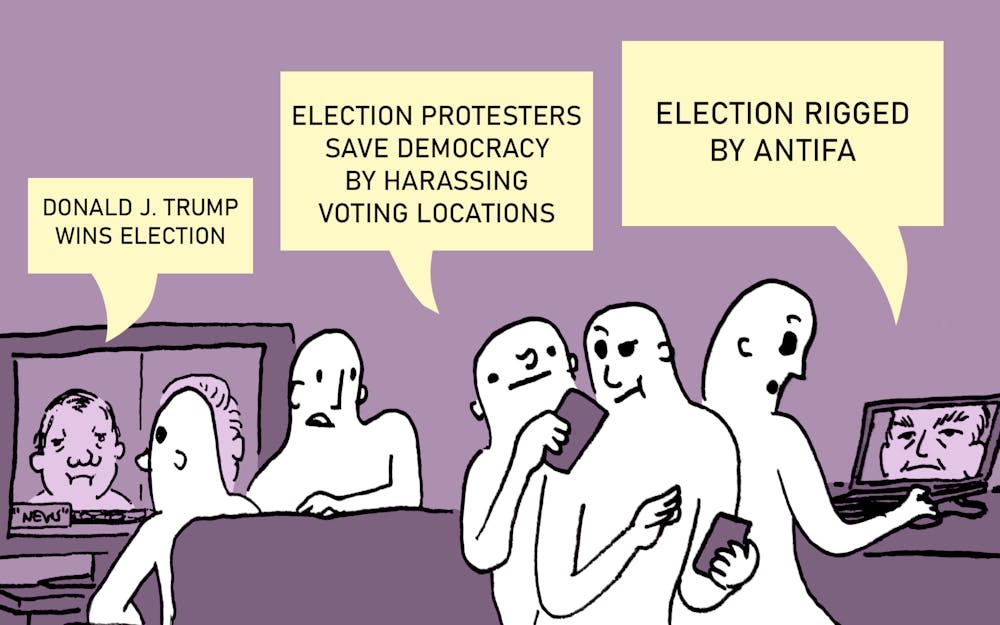Thousands of Americans are aware of and believe untrue narratives pertaining to the recent presidential election, according to a survey by IU’s Observatory on Social Media.
The surveys analyzed the public’s awareness of unsupported narratives and to what extent they believed them to be true.
The most-believed narrative, which 54.9% of participants reported believing, was that the FBI spied on Donald Trump’s presidential campaign. Another narrative, believed by 45.3% of respondents, was that Joe Biden is mentally unfit to be president. Another 48.9% reported believing mail-in ballots were a cause of election fraud.
The least-believed narrative was that face masks increase the risk of spreading COVID-19, with only 22.3% indicating they thought it to be true.
The Observatory sent out six waves of surveys from August to November. The final report released in January included an overview of findings from each wave. The goal of the study was to assess the extent of Americans who believe in false 2020 election narratives, according to the official report.
The study surveyed 4,190 American adults from 18 to 88 years old. Funding for the research came in part from the Knight Foundation, a national nonprofit that provides grants for journalism, communities and the arts. The Foundation supports the Observatory with a grant.
Researchers collected data by showing participants five screenshots of trending narratives from social media and asking them whether they had seen the narratives before as well as if they believed them. In addition, the survey examined how characteristics like political leanings and media use impacted vulnerability to false narratives.
Harry Yan, an IU Ph.D. student and research assistant with the Observatory, said social media, politicians and mainstream media contribute to spreading false election narratives. This is because, Yan said, the media provides a platform for not only politicians but also regular citizens to propagate untrue information. He also said people’s own cognitive biases play a role in their beliefs.
Age is also a factor. Young people had a greater awareness of false narratives and are more aware of information that goes against their partisan candidates, sometimes even believing information that criticizes the candidate they support, Yan said.
“The way they report their awareness and beliefs break away from the partisan line,” Yan said.
The study found right-leaning voters were more inclined to believe false narratives. For example, 65.3% of Republicans indicated a belief that President Joe Biden is mentally unfit to be in office, while none of the Democrats surveyed believed so. Yan also said right-wing sources typically generate a large amount of conspiracy theories and false information.
However, the study also found left-leaning participants to hold untrue beliefs, too. When asked if they believed that Trump would eliminate Social Security and Medicare upon re-election, 48.5% of left-leaning participants indicated it was likely.
Media School Dean James Shanahan said no one is immune to false information.
“People of all political viewpoints can be susceptible to it,” Shanahan said. “There’s people on the left side that also buy into conspiracy theories that fit their thinking.”
Mike Gruszczynski helped support the research as an affiliated faculty member on the Knight Foundation’s grant. He said he believes false narratives in part may have affected the outcome of the election, because although many people have deeply rooted political beliefs, Gruszczynski said some have begun to support a candidate or political party they previously did not over the past four years. He said these “weak partisans" are more likely to be affected by misinformation.
Gruszczynski said people should work to develop a greater sense of media literacy in order to combat misinformation. He said people can do this by examining what sources they get information from.
“A lot of it is just before you click retweet or share or repost, it’s important to just take a breather and take a look at who is saying this,” Gruszczynski said.




